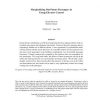Free Online Productivity Tools
i2Speak
i2Symbol
i2OCR
iTex2Img
iWeb2Print
iWeb2Shot
i2Type
iPdf2Split
iPdf2Merge
i2Bopomofo
i2Arabic
i2Style
i2Image
i2PDF
iLatex2Rtf
Sci2ools
140
click to vote
UAI
2003
2003
Marginalizing Out Future Passengers in Group Elevator Control
Group elevator scheduling is an NP-hard sequential decision-making problem with unbounded state spaces and substantial uncertainty. Decision-theoretic reasoning plays a surprisingly limited role in fielded systems. A new opportunity for probabilistic methods has opened with the recent discovery of a tractable solution for the expected waiting times of all passengers in the building, marginalized over all possible passenger itineraries. Though commercially competitive, this solution does not contemplate future passengers. Yet in up-peak traffic, the effects of future passengers arriving at the lobby and entering elevator cars can dominate all waiting times. We develop a probabilistic model of how these arrivals affect the behavior of elevator cars at the lobby, and demonstrate how this model can be used to very significantly reduce the average waiting time of all passengers. To appear in Proceedings of the Nineteenth Conference on Uncertainty in Artificial Intelligence, UAI-2003, A...
Electric Research Laboratories | Future Passengers | Mitsubishi Electric Research | UAI 2003 | UAI 2008 |
| Added | 01 Nov 2010 |
| Updated | 01 Nov 2010 |
| Type | Conference |
| Year | 2003 |
| Where | UAI |
| Authors | Daniel Nikovski, Matthew Brand |
Comments (0)

